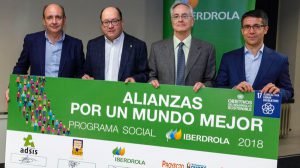Fundación Iberdrola collaborates, through its Social Aid Programme, with the organisations Proyecto Hombre Alcándara Salamanca, Proyecto Hombre Aldaba Valladolid, ADSIS and FECLEM, helping close to 3,000 people who benefit from these projects developed and implemented with the support of the company.

In recent years the Iberdrola has funded almost twenty projects within this region investing over 500,000 euros in the process.
During the presentation of these projects this morning at the headquarters of the Fundación Miguel Delibes in Valladolid, the Director of Fundación Iberdrola España, Ramón Castresana; Iberdrola’s representative in Castilla-León, Celiano García; the Chairman of Fundación Alcándara Proyecto Hombre de Salamanca, Tomás Marcos; the Chairwoman of Fundación ADSIS de C-L, Aurora Corona; the Chairwoman of Fundación Tutelar FECLEM for people with mental health problems in León, Mª Rosario Martin, and Mª. Paz de la Puente, Director of Fundación Aldaba Proyecto Hombre in Valladolid, in the presence of Germán Delibes, Trustee of Fundación Iberdrola, positively valued the collaboration undertaken in recent years and detailed the initiatives that these organisations plan to develop and implement in 2018.
In recent years the Iberdrola has funded almost twenty projects within this region investing over 500,000 euros in the process.
In relation with Proyecto Hombre Alcándara Salamanca, an initiative that Iberdrola has supported since 2011, its objective is to offer drug users specific treatment for their addictions, allowing them to attain personal independence at all levels by encouraging a normalised adaptation to their environments and social inclusion.
To this end, the organisation offers psychotherapy – in groups, one-to-one and for families -; guidance, assessment and diagnostic services – networking -; workshops to help stimulate executive functions; seminars to improve personal effectiveness; health workshops and educational/therapeutic activities. This programme directly benefits over 100 people with addictions.
For its part, Proyecto Hombre Aldaba Valladolid conducts a programme that intends to improve strategies and initiatives that focus on preventing and assisting those with a drug problem that include gender mainstreaming with a view to helping both men and women who find themselves in this situation.
From its headquarters in Valladolid, it has developed a project with three areas of intervention: raising awareness and providing information for men and women in danger of exclusion; treatment and insertion of women with problems of drug abuse or dependency, and training courses in the areas of addictions and gender for specialists working for associations and organisations. A total of 290 people have benefited from this project, which Iberdrola has supported since 2016.
With regard to the initiative of Fundación ADSIS, also based in Valladolid, which Iberdrola has supported since 2016, its objective is to implement an educational process that successfully allows participants to transit from a situation of protection to a situation of personal independence, which in turn allows for the emancipation of minors with family problems.
During this time over 65 young people between the ages of 18 and 21, who while they were minors were under the care of protective services and/or in a situation of social exclusion or abandonment, have received academic support and school counselling; social/educational interventions customised to the needs of each young person; and a personalised social/labour insertion programme with its corresponding analysis and monitoring.
Lastly, the project from the León-based Fundación Tutelar de personas con enfermedad mental (FECLEM) intends to contribute to improving the quality of life of persons will mental illness by protecting their rights, looking after their well-being and promoting their independence by supporting them in all their needs for their psychosocial development by offering a direct proximity-oriented individualised response.
Its centre, based in El Bierzo, is in charge of monitoring and medical supervision, as well as of meeting their needs – accompanying and supporting them in their daily activities, leisure and free time, communication and coordination with the Supervisory and Assistant Supervisory Authority -.
This is the first year that Iberdrola is collaborating with this organisation, where it is estimated that a total of 2,000 direct and indirect users will benefit from the initiative.
IBERDROLA, committed to society
Every year Iberdrola, through its Spanish foundation, supports around thirty social projects in Spain. Thanks to this programme, since 2010 over 300 projects have been promoted, with an annual average impact on 45,000 people. In addition, these projects also encourage voluntary work and contribute to job creation.
This initiative helps Iberdrola achieve the Sustainable Development Goals (SDG) defined by the United Nations Agenda 2030, which it has integrated into its business strategy. This aid helps the company to focus its efforts on meeting goals 1 (no poverty), 3 (good health and well-being), 4 (quality education), 5 (gender equality) and 10 (reduced inequalities).
